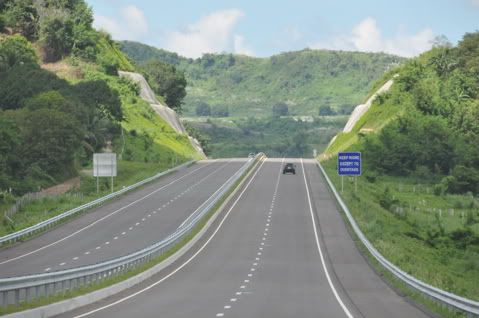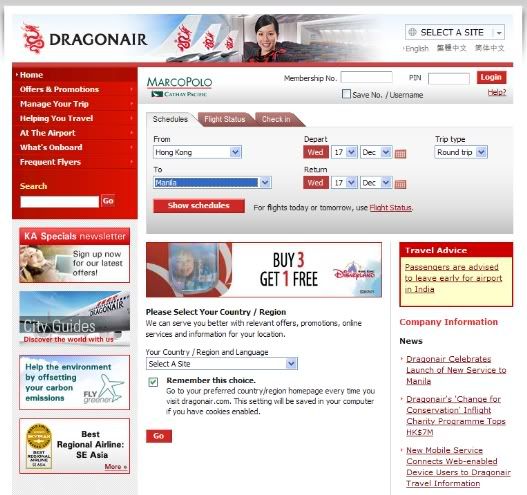Friday, January 2, 2009
New QC major thoroughfare to begin construction soon
By the middle of next year, motorists will have better access between Mindanao Avenue and Commonwealth Avenue, as Quezon City mayor Sonny Belmonte announced the construction of new roadway connecting the two major thoroughfares. For the full story, read this.
Filed under the following topics:
roadway,
transportation
Wednesday, December 17, 2008
Update: SCTEx access to open on Dec. 23

Access to Clark from the SCTEx is seen to improve with the planned opening of the Panday Pira road next week. The full report is available here. More interchanges are scheduled to open in the first quarter of 2009.
Filed under the following topics:
expressway,
SCTEx
Wednesday, December 3, 2008
Taxi tip suspended
Following the global drop in oil prices, the Land Transportation and Franchising Regulatory Board (LTFRB) announced today that the cost of public transportation for jeepneys and taxis has been reduced. This means that the minimum fare for a jeepney ride is back to P7.50, while the P10.00 on top of the meter for taxi rides was removed as well. However, given the unpredictable nature of oil prices, the LTFRB stated that the fare reductions, particularly the removal of the P10.00 additional fare, will be for a period of 3 months only.
You may read the full news article here.
You may read the full news article here.
Filed under the following topics:
LTFRB,
transportation
Wednesday, November 19, 2008
Costs of rail projects increase
Further to yesterday's news regarding the additional funds needed for the Northrail, Business Mirror reports today that other rail-based projects have also jacked up their costs. Normally, the opposition would see this as an additional burden to the people which clearly smacks of corruption. The government and the proponents of the project would naturally deny anything irregular with the need for additional funds, but to dismiss the possibility of corruption altogether would be far from realistic.
Nevertheless, the plans look beautiful on paper, and these projects should be railroaded, not necessarily at all costs though, if that means money is no object.
Nevertheless, the plans look beautiful on paper, and these projects should be railroaded, not necessarily at all costs though, if that means money is no object.
$280M more sought for Phase 1 of Northrail due to design change
The North Luzon Railways Corp. (NLRC) is requesting for an additional $280 million for the Northrail Phase 1 project due to a change in its project design.
The proposal was recently submitted to the National Economic and Development Authority’s (Neda) Infrastructure Committee (InfraCom), the interagency committee in charge of advising President Arroyo on infrastructure development, including railways, highways and airports.
Neda said the revision in its project design involved changing the narrow-gauge tracks, which were initially approved by the Neda Investment Coordination Committee (ICC) to sturdier standard or double-gauge tracks.
Neda Deputy Director General Rolando Tungpalan said the NLRC cost-increase proposal will have to go through an evaluation of the InfraCom and then go through the ICC process starting with the ICC Technical Board until the proposal obtains Neda Board approval.
However, Tungpalan said, in line with the plans of the government to speed up all infrastructure projects and programs, the Neda will also hasten its evaluation and approval of the NLRC’s request for additional funding.
The additional cost will be added to the initially approved cost of $503 million.
The China Export Import Bank will finance $421 million of the total project cost, while the remaining $82 million will be shouldered by the national government.
Phase 1 Section I of the Northrail project runs from Caloocan to Malolos, Bulacan. The contractor for the project is the China National Machinery and Equipment Group.
The NLRC stated on its web site (www.northrail.com.ph) that it aims to end 2008 with a project accomplishment rate of 61.87 percent, mostly comprised of civil works.
It also aims to acquire additional right-of-way (ROW) and relocate affected utilities by December 2008. The NLRC expects to complete the civil works for the project by August 2009.
Earlier, the Neda said seven infrastructure projects have posted cost overruns of more than P2.27 billion in the first half of 2008.
These projects include the Metro Iligan Regional Infrastructure Development Project, Rural Road Network Development Project III, Central Mindanao Road Project, Urgent Bridge Construction Project for Rural Development, and Iloilo Flood Control II.
Further, the Philippine National Railways (PNR) and Light Rail Transit Authority (LRTA) submitted cost overrun reports that showed that the Northrail-Southrail Linkage Project Phase I or the commuter- train part of the entire Northrail project will post a cost overrun of P648.12 million and the LRT Line I Capacity Expansion Project Phase II will post a P1.622-billion-worth cost increase.
The reasons include increase in prices of labor, materials and equipment/price adjustment/price escalation, changes in scope or variation orders/supplemental agreements, high bids, value-added tax and other taxes, foreign-exchange movement, increase in consulting-service costs, administrative costs, and increase in ROW or land acquisition and resettlement costs as well as price adjustments.
The 32-kilometer Northrail-Southrail linkage Phase 1 will run from Caloocan to Alabang and service 16 stations along the route. The PNR estimated that the average travel time from end-to-end is 30 to 35 minutes, while 21 new diesel railcars are expected to accommodate 187,000 passengers daily.
Phase 1 will cost $50.42 million, and around 70 percent, or $35 million, will be funded through a concessional loan from the Economic Development Cooperation Fund of Korea.
The balance will be in the form of export credit from the Korean Export-Import Bank.
The LRTA said, on the other hand, that the LRT Line I capacity expansion project Phase II will aim to extend its services to an additional 40,000 passengers per hour per direction (pphpd) from the already expanded capacity (Phase I) of 27,000 pphpd.
The agency said the project is intended to cope with the present and expected increase in volume of passengers using LRT Line 1 and the additional passenger demand to be generated under an integrated MRT Line 1, 2 and 3 system.
The project costs P11 billion, and is 85-percent financed by the Japan Bank of International Cooperation.
Subscribe to:
Posts (Atom)




